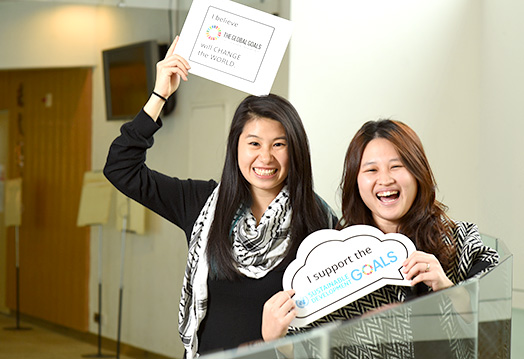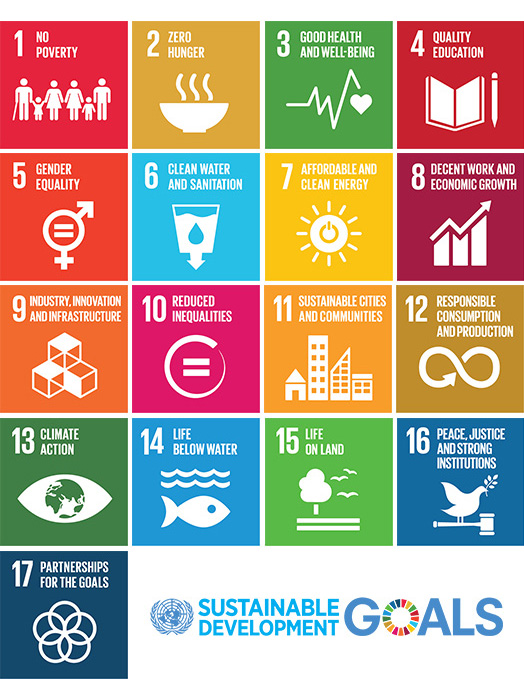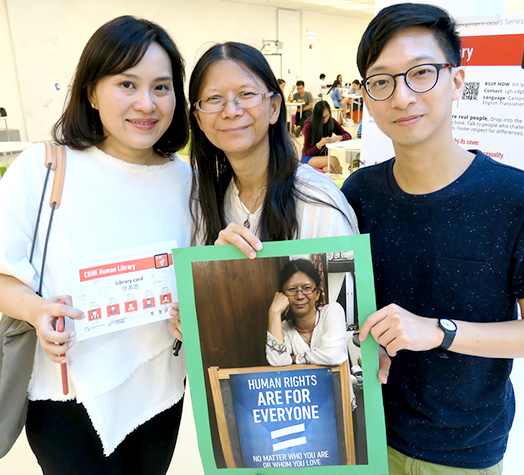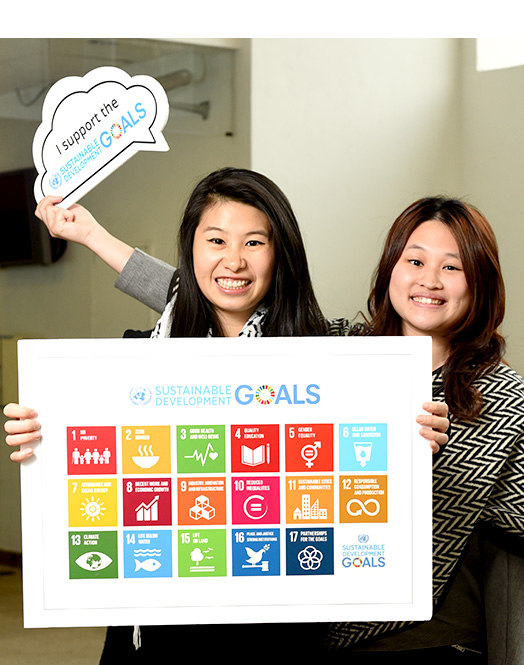
Centre for Global Health’s Take on SDGs
Over the course of last year, the Centre for Global Health of CUHK had run nine activities to promote the Sustainable Development Goals (SDGs) initiated by the United Nations. We spoke to Ms. Hale Ho and Ms. Sharon Lo of the Centre about why it is so important to plant the SDGs in Hong Kong soil.
Sharon-->
 <--Hale
<--Hale
1. Could you briefly explain what the SDGs are about?
 : The SDGs are a set of ambitious development targets which were adopted by all 193 United Nations Member States in September 2015. Consisting of 17 goals and 169 targets, they encompass a broad agenda relating to almost all aspects of societal progress, spanning from poverty, inequality, hunger and health to education, energy, environment and peace. The SDGs represent an internationally-agreed global action to end poverty, protect the planet and ensure prosperity for all by 2030.
: The SDGs are a set of ambitious development targets which were adopted by all 193 United Nations Member States in September 2015. Consisting of 17 goals and 169 targets, they encompass a broad agenda relating to almost all aspects of societal progress, spanning from poverty, inequality, hunger and health to education, energy, environment and peace. The SDGs represent an internationally-agreed global action to end poverty, protect the planet and ensure prosperity for all by 2030.
2. Why has the Centre devoted itself to localizing the SDGs?
 : As a Special Administrative Region, Hong Kong is represented by China at United Nations negotiations and agreements. However, although we have a lot of control over our domestic affairs, we do not come under much pressure to actively implement any of these international agreements China has entered into. As such, issues like the SDGs are not talked about much in the local setting and remain a low priority on the government’s agenda.
: As a Special Administrative Region, Hong Kong is represented by China at United Nations negotiations and agreements. However, although we have a lot of control over our domestic affairs, we do not come under much pressure to actively implement any of these international agreements China has entered into. As such, issues like the SDGs are not talked about much in the local setting and remain a low priority on the government’s agenda.
Although they are a global framework, the SDGs can only be achieved through implementation at the local level. Without strategic government programmes coupled with the efforts of NGOs, academia, businesses, civil society and individuals, they will only amount to a set of idealistic aspirations.

3. Mentions of poverty and hunger bring to mind pictures of starving children in developing countries in Africa or Southeast Asia. How are these global issues relevant on a local scale?
 : Although Hong Kong can seem fairly affluent on the outside, this city faces some uncomfortable realities. Hong Kong has the highest level of income disparity among the developed economies. Although we have abundant displays of wealth, one in five people in Hong Kong live in poverty, with 100,000 people living in cage homes and rooftop shacks.
: Although Hong Kong can seem fairly affluent on the outside, this city faces some uncomfortable realities. Hong Kong has the highest level of income disparity among the developed economies. Although we have abundant displays of wealth, one in five people in Hong Kong live in poverty, with 100,000 people living in cage homes and rooftop shacks.
Meanwhile, our consumerist culture is inherently unsustainable and will lead to future crises relating to energy supply, pollution and climate change. People in Hong Kong need to be more aware that our consumer choices have a ripple effect on the situation of workers and environmental degradation across the world. We may think we are just buying cheap products, but the reality is that by not paying attention to where they come from or who made them, we may be inadvertently perpetuating the damage and the suffering.

4. The Centre’s Sustainable Development Goals Series held a diverse range of events to promote the SDGs in 2016. Which were your proudest moments?
 : Our proudest moments are: the CUHK Human Library, the Refugee Run simulation, and the True Cost documentary screening.
: Our proudest moments are: the CUHK Human Library, the Refugee Run simulation, and the True Cost documentary screening.
The CUHK Human Library was a great event because it enabled students to meet with people they wouldn’t ordinarily have the chance to meet—people who challenge gender and sexual stereotypes, including a transgender activist, intersex therapist, house husband, female body builder and female pastor. This provided spaces for students to learn from their stories, engage in raw conversations and hopefully foster a respect for differences.
The Refugee Run simulation was thought-provoking because it gave participants the opportunity to experience some of the challenges which refugees experience each day.
The True Cost documentary screening was particularly holistic. Apart from raising awareness about the social and environmental cost of the global fashion industry, we had an exhibition of the fair trade goods available on the Hong Kong market, and a post-screening discussion on avenues to take action to promote sustainable consumption and production (SDG #12) at an individual, university and organizational level.

5. Any significant change in participants’ perception of the SDGs before and after the events?
 : Yes! In our evaluation of the SDGs Series last year, over 70% of participants stated that they had gained new knowledge of the SDGs and how they are relevant to the Hong Kong context, had a stronger belief in the importance of the SDGs and were challenged to consider how to use their time, skills and resources to contribute toward these global goals.
: Yes! In our evaluation of the SDGs Series last year, over 70% of participants stated that they had gained new knowledge of the SDGs and how they are relevant to the Hong Kong context, had a stronger belief in the importance of the SDGs and were challenged to consider how to use their time, skills and resources to contribute toward these global goals.
In addition, we have received a lot of positive feedback from individuals who were moved by some of our various events. For example, we were at a meeting last August with the Institute of Future Cities, when one of their staff told us that she had stopped buying clothes as a result of our True Cost documentary screening! That was very cool.

6. What can we do if we want to contribute toward the SDGs in our day-to-day lives?
 : Opting to live a sustainable lifestyle through reducing our food and general waste, walking or taking public transport, recycling, upcycling, participating in goods exchange—these all help to reduce our carbon footprint. By actively buying less and supporting ethical or fair trade businesses, we can have a massive impact on producers across the world. Choosing to regularly give a portion of our allowance or salary to NGOs is also an easy and practical way to show support.
: Opting to live a sustainable lifestyle through reducing our food and general waste, walking or taking public transport, recycling, upcycling, participating in goods exchange—these all help to reduce our carbon footprint. By actively buying less and supporting ethical or fair trade businesses, we can have a massive impact on producers across the world. Choosing to regularly give a portion of our allowance or salary to NGOs is also an easy and practical way to show support.
For those in positions of influence, they can integrate the SDG paradigm into their areas of work. For example, Prof. Emily Chan, the Centre’s Director, actively promotes the SDGs in her global health classes and runs mock negotiations so that students understand more about the SDGs and their impact on global health issues. People running student initiatives or NGOs can explore how they can adapt their programmes to address specific SDG indicators and targets. Those working in the corporate sector can advocate for greater CSR policies and initiatives, or provide financial support for SDG-related initiatives.
So whoever he/she is, whether young or old, inside or outside of CUHK, everyone can make a difference and contribute toward the SDGs! CGH will continue to partner with units such as CCOUC, JCSPHPC and the Gender Studies Programme to creatively promote the SDGs around CUHK and the Hong Kong community throughout 2017.
Applications to join the SDG Steering Committee are now open until 5 February. CUHK students, faculty and staff from all backgrounds are welcome to apply.


